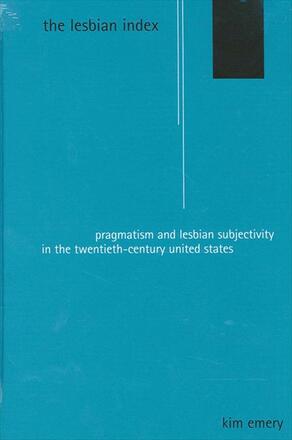
The Lesbian Index
Pragmatism and Lesbian Subjectivity in the Twentieth-Century United States
Alternative formats available from:
Adds historical and philosophical perspectives to current debates over whether lesbian identity is socially constructed or genetically based.
Description
For more than a century, female homosexuality has been a frequent flashpoint for conflicts configured around such oppositions as nature and nurture, essentialism and constructivism, foundationalist philosophies and poststructuralist ones. In The Lesbian Index, Kim Emery offers the pragmatic semiotics of C. S. Peirce as a way out of this divide. In particular, she introduces Peirce's notion of "indexicality," which marks the intersection of the historical world with the conceptual one, as a useful theoretical tool for tracing the development of lesbian existence and experience. Through readings of historically significant literary works, from the first known U.S. novel with an avowedly homosexual heroine (1895's Norma Trist) to Mary McCarthy's incongruously queer midcentury account of American womanhood (1963's The Group) to Sarah Schulman's damning re-vision of On the Road (1986's Girls, Visions, and Everything), Emery demonstrates how fictional accounts of lesbian lives have engaged key national narratives, reexamining race, rights, private enterprise, imperialism, and other core concepts of American culture. In the process, she accumulates considerable evidence that representations of lesbian identity are not peripheral to mainstream U.S. culture, but a crucial locus and telling index of contested American meanings.
Kim Emery is Assistant Professor of English at the University of Florida.
Reviews
"Because this book engages pragmatism and some versions of poststructuralism and queer theory together with textual readings, it is unlike other books on the market. I like the way Emery weaves together theoretical arguments and literary observations (the chapter on Norma Trist makes for particularly interesting reading). The book has much to offer the growing field of lesbian/gay/queer studies." — Carolyn Allen, coeditor of Provoking Feminisms
"Kim Emery offers a possible resolution to the divide in lesbian studies that she elaborates in such detail." — Deborah S. Wilson, coeditor of Bodily Discursions: Genders, Representations, Technologies